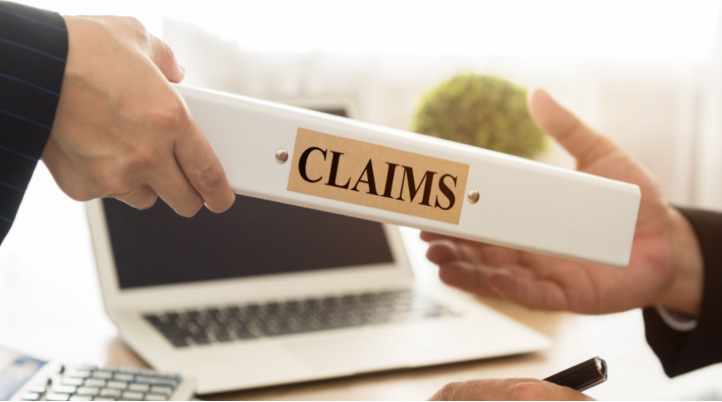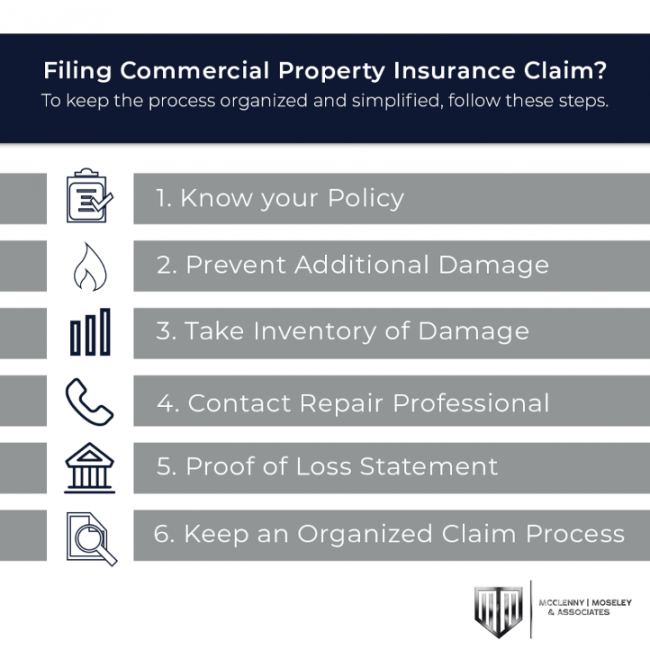
Filing Commercial Property Insurance Claims – Everything You Need to Know
After a catastrophe, often the last thing commercial property owners want to deal with is the complex process of settling insurance claims. But, if they want to get back on their feet as soon as possible, it is vital to tackle this situation early on.
When Should You File a Business Insurance Claim?
When damage happens to your business property, the insurance provider should be notified as soon as possible. One of the key reasons is that claims are easier for insurers to adjust or bring to resolution when the damage is fresh. On the other hand, long lag times may lead to additional damage and more doubt about the cause. This may result in a reduced likelihood of coverage for the business owner.
Also, notice by the policyholder within a specific timeframe is often a contractual requirement of commercial insurance policies and something a smart business owner will ask a lawyer to look at and advise them on when they choose their coverage. Even without a contractual timeframe in the policy, the Texas courts will generally not enforce any claim made after an unreasonable time has passed or two years after a business becomes aware of the damage.
Check out this commercial property insurance guide for more information.
What Should You Know Before Filing a Commercial Property Claim?
The key to a successful commercial property claim is extensive documentation from the source closest to the damage, which is you, the business owner. You are the “boots on the ground,” so be ready to snap hi-res photos and keep detailed receipts.
In fact, not having and maintaining the proper documentation can be the number one detriment to successful property damage claims.
Once again, business owners are advised to look to the policy itself, which is a binding legal contract, to see what types of recordkeeping are required and what will have to be submitted for each type of claim. This could include, for example, a detailed inventory of damaged and undamaged property, photos and videos of the damage, and a record of communications with all parties involved, such as employees, adjusters, repair professionals, and others.
How to File a Commercial Insurance Claim

Although there are varying procedures based upon the requirements of each commercial insurance policy and the type of claim, most claims will follow this trajectory:
1. Know your Policy. Read through your property insurance policy carefully. It is critical to understand what is covered and excluded, what you have to do, and how to settle the claim. If you are having trouble grasping the entire policy, it is wise to seek help from a qualified property adjuster.
2. Prevent Additional Damage. Temporary repairs to your damage prevent the delay of additional damage that may not be covered. Ensure that the damaged area is safe for you to repair before tackling the project.
3. Take Inventory of Damage. This can be a very time–consuming project, but if handled correctly, you’ll avoid any further delay due to lack of proof. First, take detailed notes of the damage to the best of your ability, then take pictures and videos to back them up. Too much proof is better than too little.
4. Contact Repair Professionals. Consult with multiple contractors and keep notes of every conversation that pertains to your claim.
5. Proof of Loss Statement. The most important thing to keep the process smooth and successful is submitting a precise Proof of Loss statement. Be thorough and organized while filing this document; use the notes, photographs, and estimates from contractors to ensure your form is as accurate as possible. A qualified public adjuster can be of assistance to help you determine an estimate of damage repair costs and maximize your claim settlement.
6. Organized Claim Process. Filing your property insurance claim is not a quick process, so it is essential to document every step. Keep a journal of every detail of the process- conversations, events, times, dates, and names of people. Try to communicate by email whenever possible, or use the journal to write down summaries of phone calls.
This information includes your contact information, the contact information for anyone involved with the claim, the type of claim you are filing, information about the loss, a description and supportive photos, videos, and other information related to the claim.
The settlement will generally come in one of two forms. The first is cash value, where the provider pays out what lost, damaged, or destroyed business property is worth at the time of the loss, including depreciation. The second is replacement value, where the provider reimburses the damaged or destroyed business property with a brand-new equivalent. To access the replacement value option, businesses usually pay higher insurance premiums. Still, this option is often found to be worth it by companies with substantial infrastructure or assets, such as in the tech sector.
After You File
Within 24–48 hours of submitting a claim, your business insurance provider will likely assign an adjuster to your case. Their adjuster will arrive to assess their take on the damage, ask questions, collect more evidence from you, and return to the office to generate a report. This report will chart the course for approval or denial of your claim.
After the adjuster comes, you can begin to get estimates for the repairs or replacement. Most insurance companies recommend obtaining more than one quote for the work; some may require a certain number of comparative quotes or have a specific affiliate provide the quote.
After the quotes have been submitted, the insurance company may deny or approve your claim. If approved, you can proceed with repair or replacement, which could start as out-of-pocket with reimbursement on the way or could involve direct billing to the insurance company.
Check out this insurance claim timeline to learn more.
Commercial Property Insurance Claims Examples
Common types of commercial property insurance claims include commercial buildings, commercial auto, commercial property, business interruption, general liability where third parties are hurt, or third-party property is damaged, and workers’ compensation.
Get Legal Help with Filing Commercial Insurance Claims Today
This can be challenging and exhausting, but the more patience and determination you have, the better your chances are of restoring your commercial property with fair compensation for the damages.
If you have questions about the commercial property claims process or need legal help concerning your contractual rights, reach out to our team today. As professionals who help clients interpret contracts, understand their rights, and recover their losses every day, the commercial property insurance lawyers at McClenny Moseley & Associates are qualified to serve as your business insurance guides.
Contact our firm today for this valuable business assistance.
This blog published by MMA Law Firm is available for informational purposes only and is not intended to be legal advice on any subject matter. The content available on this website may not constitute the most up-to-date legal or other information.